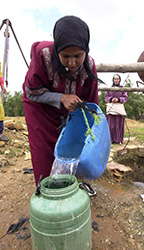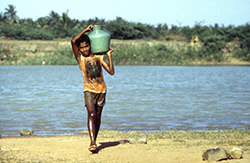Water & poverty
 Water is crucial for economies and livelihoods and central to poverty reduction
Water is crucial for economies and livelihoods and central to poverty reduction
There has been steady recent progress against poverty worldwide. In most regions, however, especially East Asia, South Asia and sub-Saharan Africa, poverty is still much more widespread in rural areas than in cities. Seventy-eight percent of the world’s poor (nearly 800 million people) live in rural areas (World Bank, 2016).
Most of the rural poor are smallholders and family farmers, for whom a common constraint – and a crucial factor in determining rural poverty – is the insufficient availability of, and unreliable access to, water, not only for food production, but also for socio-economic development and environmental sustainability. Improving agricultural water management, therefore, is a priority for supporting the livelihoods of rural smallholders; it is also one of the most potent forces for poverty alleviation and rural development.
By increasing knowledge on the role of water in rural livelihoods and adopting participatory approaches focused on smallholder farmers, FAO works to build resilience, identify and adapt water technologies, and promote smart investments in water for poverty reduction.
 There is a need to develop new models for planning and implementing agricultural water management investments, by taking into account the diversity and complexity within countries and by tailoring interventions to the priorities and livelihood strategies of rural people. Rural water development strategies must deal with multiple local livelihood systems and with communities that have limited capacity for agricultural investment and in which risk-avoiding strategies predominate. Guidance is needed to improve and apply knowledge on what works best under which circumstances and to use such knowledge to inform farmers about best practices, improve national policies and institutions, and influence development strategies on agricultural water management.
There is a need to develop new models for planning and implementing agricultural water management investments, by taking into account the diversity and complexity within countries and by tailoring interventions to the priorities and livelihood strategies of rural people. Rural water development strategies must deal with multiple local livelihood systems and with communities that have limited capacity for agricultural investment and in which risk-avoiding strategies predominate. Guidance is needed to improve and apply knowledge on what works best under which circumstances and to use such knowledge to inform farmers about best practices, improve national policies and institutions, and influence development strategies on agricultural water management.
In its efforts to support effective water-related interventions to improve livelihoods in rural areas, FAO works with international and national partners to increase the benefits of poverty reduction strategies for poor smallholder farmers. For example, the Organization:
 develops methodologies based on the concept of livelihood mapping to help investors and policy-makers in prioritizing, planning and implementing water-related interventions in support of smallholder farmers;
develops methodologies based on the concept of livelihood mapping to help investors and policy-makers in prioritizing, planning and implementing water-related interventions in support of smallholder farmers;- performs regional and national studies on rural poverty reduction through water-related interventions; and
- identifies water technologies and approaches to increase the impact of development projects targeting poor farmers.
Supporting effective and sustainable water-related interventions that contribute to rapid improvements in the livelihoods of the rural poor will help in attaining Sustainable Development Goal 1: “End poverty in all its forms everywhere”.
